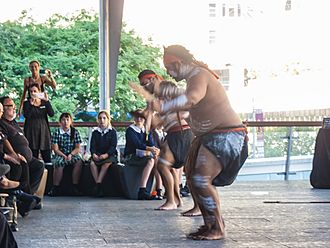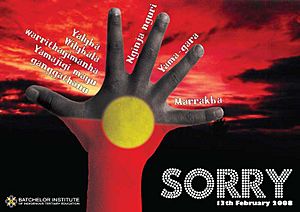National Sorry Day facts for kids
Quick facts for kids National Sorry Day |
|
|---|---|

2016 National Sorry Day event in Brisbane
|
|
| Also called | National Day of Healing |
| Observed by | |
| Type | Cultural |
| Significance | Commemoration of the Stolen Generations |
| Date | 26 May |
| Next time | 26 May 2026 |
| Frequency | Annually |
| First time | 26 May 1998 |
National Sorry Day, also known as the National Day of Healing, is an important event held every year in Australia. It takes place on May 26. This day remembers the Stolen Generations. These were Indigenous children who were sadly taken from their families.
National Sorry Day is part of a bigger effort called reconciliation. This means working towards a better relationship between Indigenous and non-Indigenous Australians. The first National Sorry Day happened in 1998. It followed a special report that looked into how Indigenous children were treated. In 2008, Australia's Prime Minister, Kevin Rudd, said "sorry" to Indigenous Australians on behalf of the government. This was a very important moment.
Contents
What is National Sorry Day?
National Sorry Day is a yearly event in Australia on May 26. It honors the Stolen Generations. These were Aboriginal and Torres Strait Islander children. They were forcibly removed from their families during the 20th century. This was done to try and make them live like white Australian people.
The "Bringing Them Home" Report
The first National Sorry Day was held on May 26, 1998. Many Australian community groups helped organize it. This day marked one year after a special report was shared with the Australian Parliament. This report was called Bringing Them Home.
Why the Report Was Made
The Bringing Them Home report was created after a big investigation. This investigation looked into government rules and actions. These rules had caused the Stolen Generations. The report made 54 suggestions. One suggestion was to give money for healing services for Indigenous people. Another was for the government to say a formal "sorry."
Government Apologies and Actions
At first, Prime Minister John Howard did not want to say "sorry." He did not believe that terrible acts were committed against Indigenous Australians. In 1999, his government passed a "Motion of Reconciliation." This motion expressed "deep and sincere regret" for the unfair things Indigenous Australians suffered. But his government also said they were not responsible for what past governments did.
Later, Prime Minister Kevin Rudd gave a formal apology in February 2008. He was the first Prime Minister to do this officially. This was a very significant step.
Challenges and Ongoing Issues
Even with the apology, many suggestions from the Bringing Them Home report have not been fully put into action. Some people protest on Sorry Day. They say that Indigenous children are still being removed from their families. This happens through the child protection system. Indigenous children are much more likely to be in out-of-home care. For example, in 2008, about 9,070 Indigenous children were in out-of-home care. By 2022, this number had grown to about 18,900.
Also, a national plan to help those affected by the Stolen Generations with money has not been set up. Some states and territories have given money, but not all. Many members of the Stolen Generations have passed away before getting any help. Sometimes, people in the non-Indigenous community question why they should apologize around Sorry Day.
In 2005, the group that organizes National Sorry Day changed its name to the National Day of Healing. Senator Aden Ridgeway suggested this. He said the day should focus on healing for all of Australian society. This healing is needed to achieve true reconciliation.
Public Acts of Reconciliation
The Bringing Them Home report has inspired many public actions. These actions show support for reconciliation.
The Sydney Harbour Bridge Walk
On May 28, 2000, over 250,000 people walked across the Sydney Harbour Bridge. Both Indigenous and non-Indigenous Australians took part. This walk was organized by the Council for Aboriginal Reconciliation. It was a protest because the government had not yet apologized. It also showed support and raised public awareness. On the same day, a plane even wrote "sorry" in the sky above the bridge.
The Uluru Statement
The Uluru Statement from the Heart is an important document. It was released on Sorry Day in 2017. This statement calls for a "Voice to Parliament" for Indigenous Australians.
Related Days and Concepts
 | Roy Wilkins |
 | John Lewis |
 | Linda Carol Brown |


